
Photo: Blake Snow
That’s Harley, the family dog. He just had his balls removed. Now he’s reduced to wearing this emasculating hat for a week to prevent post-op licking.
I think it’s funny. Harley doesn’t. But then again, he and I don’t see eye to eye on a lot of things. Continue reading…

Frankenstein back with 28 staples (credit: Lindsey Snow)
Life isn’t fair.
I was born with an 80 year-old back. Not exactly 80, but old. It first broke when I was 29. After surgery, it worked again, but only for another six years. It teetered and failed again late this summer in the same spot — a re-ruptured L4/5 disc. The thing was so decrepit, my surgeon had to remove the remains and fuse my spine.
Now I’m resigned to a life of low impact and light lifting. I can’t even hold my youngest brown-eyed boy in his final months of baby-dom, let alone lift a gallon of milk for a month. I can’t return to full activity for six months until the vertebrae fully fuse. And after that, I’m advised to give up running, basketball, soccer, and maybe wake boarding or else.
It sucks.
But it’s not all bad. In fact, I’ve got a heck of a lot to look forward to—a lot more to live for. While having my body deteriorate ahead of schedule and the long recovery are both humbling, I also feel inspired by the experience. Here are 10 things I learned post surgery: Continue reading…
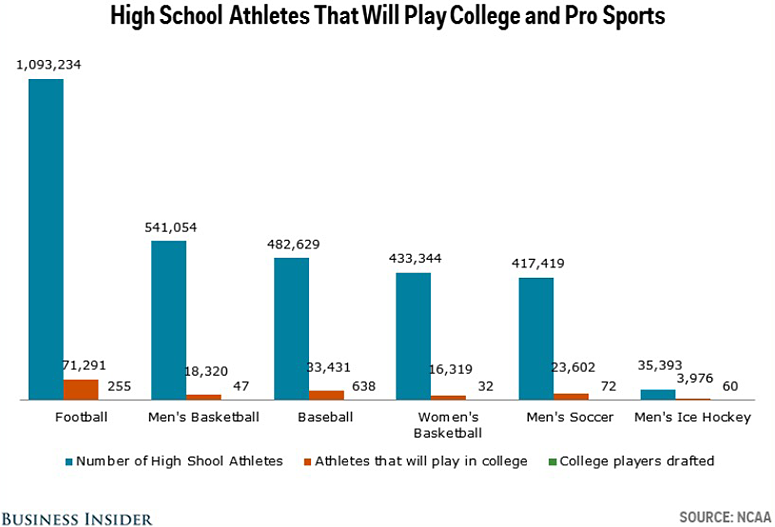
To many boys (and some girls), professional athletes are modern-day heroes. Iconic celebrities with fame, fortune, and power. What wide-eye youth wouldn’t want the same?
Turns out, a lot of them do. (With oversized Bo Jackson and Michael Jordan posters adorning my childhood walls, I certainly did.) But as with all desirable things in life, getting paid to play sports isn’t easy.
In fact, the odds are downright nasty for aspiring players, according to new data from the NCAA.
Continue reading…
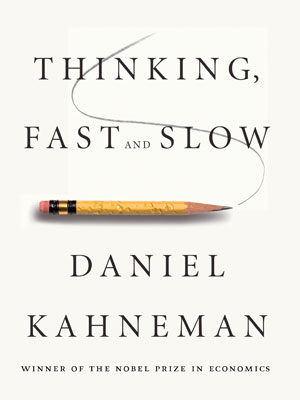 Why are suckers born every minute? How can we explain “If it seems too good to be true, it probably is“? Why are humans encouraged to “think twice” before doing things? And why do we judge “books” by their covers?
Why are suckers born every minute? How can we explain “If it seems too good to be true, it probably is“? Why are humans encouraged to “think twice” before doing things? And why do we judge “books” by their covers?
The answers to those questions and many more can be found in Daniel Kahneman’s eye-opening book, Thinking Fast and Slow. It’s a fascinating, enlightening, and scientifically accessible read.
After decades of research, Kahneman discovered that the brain makes decisions in two ways. The first is system 1 thinking—the fast, almost involuntary, and largely gut-based decision-making required to operate. It quickly processes tasks like “eat this, pick up that, move out of the way,” and even, “stay alive.” System 1 makes hundreds, if not thousands, of decisions each day and is the “hero of the book,” says Kahneman. System 1 gets things done.
System 2, on the other hand, is slow to engage, deliberate, and lazy. It deals with doubt, uncertainty, statistics, and heavy cognitive loads like writing, performing surgery, solving advanced math—anything that requires intense focus, really. System 2 is not emotional. It’s the part of your brain that questions the source, asks for hard numbers to back up claims, and is innately critical. It deems things guilty until proven innocent. Continue reading…
I don’t always study philosophy, but when I do, I make it count.
Case in point: A friend and I were recently discussing the human condition over email. Exhilarating stuff, I know. I’ll skip to the best part.
Basically, we decided that humans struggle to internalize both complex and simple realizations. Complex ones because they’re harder to grasp, and simple takeaways because we’re usually too distracted by temptations, desires, and pleasures to see them through, even if we believe in them (or so argues Aristotle; more on him later).
At this point, I asked my buddy, “So if humans struggle to comprehend both complex and simple ideas, what in the HELL are we good at?”
His reply, “Entertainment. And nothing else.” Full stop. The gravity and strategic double periods of his remark made me do this:

MGM Studios
At which point I enrolled in a 36-course undergraduate class from Smith College. Not exactly. But I did download the audible version of the class, The Meaning of Life: Perspectives from the World’s Greatest Thinkers, from Amazon!
Having already graduated (go, fight, win!), I did this solely for my own enlightenment. Little did I know how much impact professor Jay Garfield’s masterful curriculum would have on my worldview, existential outlook, and shared beliefs with others.
Here’s what I learned: Continue reading…
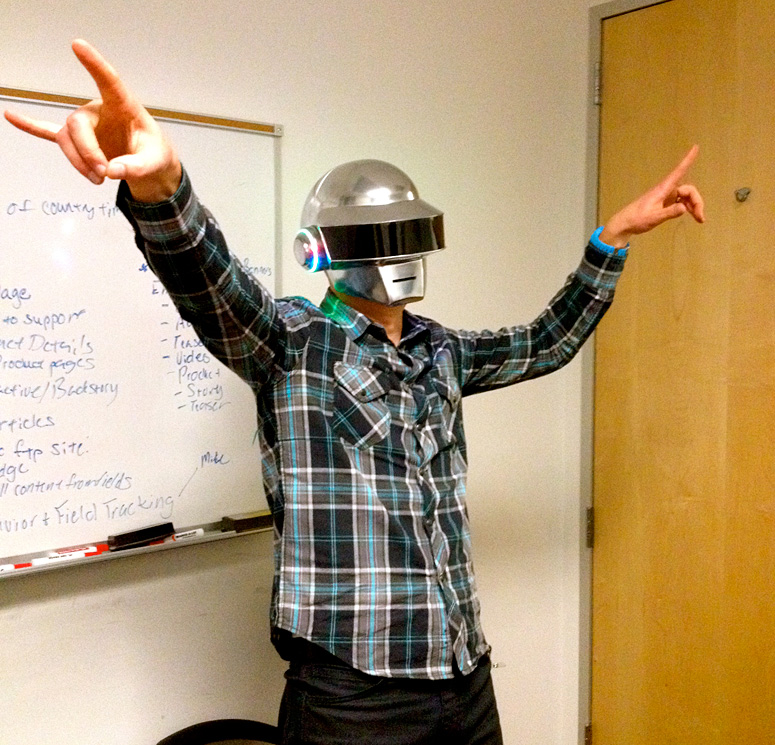
Hac Tran
While working onsite with a client last week, I met an Englishman that shared my love of music. At some point we diverged into a discussion on the merits of Daft Punk — his favorite band — and where their latest album went wrong. We both agreed that Random Access Memories was better produced than it was written; Discovery was “bloody brilliant;” and their soundtrack to Tron: Legacy was their second best work to date.
As I was about to leave, my new friend excitedly announced, “I have something to show you!” He left the room, then returned with a custom, LED-lit Thomas Bangalter mask. “May I?” said I, giddy at the prospect. “Of course,” he replied. I put it on, struck a pose, then took several snapshots for posterity’s sake before bidding him farewell.
What’s funny is this Englishman had just traveled 6,000 miles from his office in Munich for weeklong meetings with “corporate” in Los Angeles. While most people scramble for chargers and underwear the night before travel, I laughed at the thought of this kindly bloke deciding to bring his shiny keepsake along for the journey. “Ah, yes! Mustn’t forget my smashing mask.”
That’s a fan. Thanks for the memories, Daft Punk.
First published on November 6, 2013

I recently finished A Short History of Nearly Everything by Bill Bryson. From a single book I’ve never learned so much and so little at the same time. I’ve also never read a more absorbing science book. Whereas I usually highlight a few passages from each book, I highlighted more than two dozen parts of this book upon completion — it covers that much ground. Continue reading…

Like so many other peasants — and royalty for that matter — I owe much of my good fortune to luck and timing. And nothing has been more beneficial to my career than getting into blogging before it became blasé.
I barely made it. Continue reading…

Geoff Livingston
A businessman was standing at the pier of a small coastal village in Mexico. Just then, a skiff docked with one humble fisherman inside. His boat contained several large yellowfin tuna.
The businessman complimented the fisherman’s catch and asked how long it took to reel them in. “Only a little while,” the fisherman replied. The onlooker then asked why he didn’t stay out longer to catch more fish. The fisherman said he had enough to support his family’s needs. “What do you do with the rest of your time?” the man pressed.
“I sleep late, fish a little, play with my children, take siestas with my wife, stroll the village each evening, sip wine, and play guitar with my amigos,” the fisherman replied. “I live a full life, señor.” Continue reading…

Fox Networks
Even if you think you’re honest person, your integrity will forever be challenged, usually when you least expect it.
I recently learned this lesson after a client tried to overpay me by $20,000 on two separate occasions. The first time they simply wired the money into my account without realizing I was already paid. “Either they sent duplicate payment or liked my work so much they gave me a huge bonus,” I thought to myself. I knew it was the former, but sat on the blunder for a few days before notifying the client.
The reason: The devil on my left shoulder made a convincing argument. “Blake,” he said, “maybe you didn’t invoice them the first time?” Nope, I checked my records. I’ve been paid in full. “Okay,” he went on, “but they’re a billion dollar company. They won’t even notice the misplaced $10,000.”
“I doubt it,” the angel on my right shoulder replied. “Imagine if someone got fired for this. Besides, you didn’t earn this money. It doesn’t matter if you omit or commit theft—stealing is wrong. You’re better than this.” Continue reading…
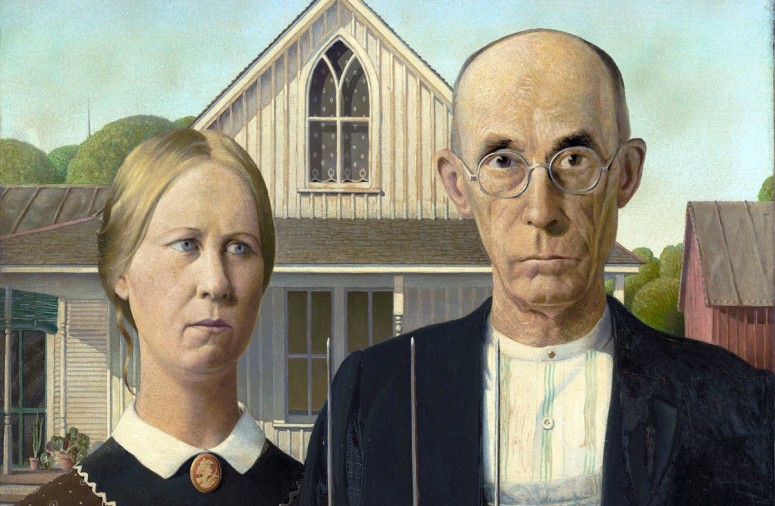
Grant Wood/Wikimedia Commons
As a leading psychologist, Shawn Achor has spent two decades studying happiness. His bona fides include award-winning researcher and teacher at Harvard, best-selling author on positivity, and popular TED lecturer.
So when he speaks you should listen. For instance, Achor asserts our circumstances — including age, race, gender, social status, and wealth — only account for 10% of our happiness. The rest is determined by our genetic baseline for happiness (i.e. optimist vs pessimist) and our individual intentions, including the way we spend our time and the things we ponder.
Obviously, happiness means different things to different people. But there are plenty of standardized things we can do to boost our chances of finding it. Somethings such as knowing oneself, learning how to forgive, and balancing the personal, professional, and social demands on our time can be life-long pursuits.
But other happiness-building attributes are quite easy, Achor argues. In order from least difficult to most difficult, they are as follows: Continue reading…

Chetah State Park
I’ve blogged for 12 years and published more than 2000 posts to date. Below are my 10 favorites from 2017:
- My new book, Log Off, is now available—what you need to know
- Blast from the past: Remember when “mixtapes” were cool?
- Top 10 ways to starve your fears
- How this movie scene changed my life
- What I believe: My 10 articles of faith
- Why I’m reluctant to call myself a journalist
- 5 reasons sad stories are good for you
- You’re doing it wrong: 7 bad habits of well-meaning parents
- 9 remarkable albums your ears must hear
- What 12 years of content marketing have taught me
Bonus: Where is America on the gender equality scale?
Thanks for reading. Anyone been here for the full 12 years? If so, I’d like to buy you lunch.

Credit: Wikimedia Commons
There are a lot of productivity myths. For instance, early birds are more productive, structure kills creativity, adding resources increases output, and more. Although well intentioned, these are all wrong.
So what works? What productivity hypotheses have been tested and proven by science? After sifting through dozens of top search results, reports, and studies, this is what I found. The most convincing, substantiated, and established productivity strategies: Continue reading…
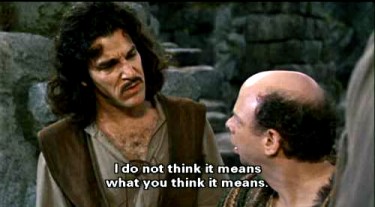
“The Princess Bride” 20th Century Fox
As a writer, I sometimes get reader mail.
Most of it relates to typos. Some of it relates to disagreement or additional viewpoints. On occasion, I even get fan mail—how lovely.
As for typo-related mail, most of that is really nice. “Hey, Blake. Enjoyed your story on [insert popular story here]. Noticed a typo, however, and thought I’d share.”
Some of it gives me the benefit of the doubt. “Hi, Blake. Perhaps your spellcheck mistakenly changed ‘espoused’ to ‘expelled’?”
“No, kind reader,” I’ll reply. “My bad diction stuck again. Thanks for keeping me honest.”
Still, some of the mail I receive is unforgiving. As if my mistakes should disbar me from contributing to mainstream media. As if I should master English before using it to articulate a point, tell a story, answer a question, or inspire change. Continue reading…
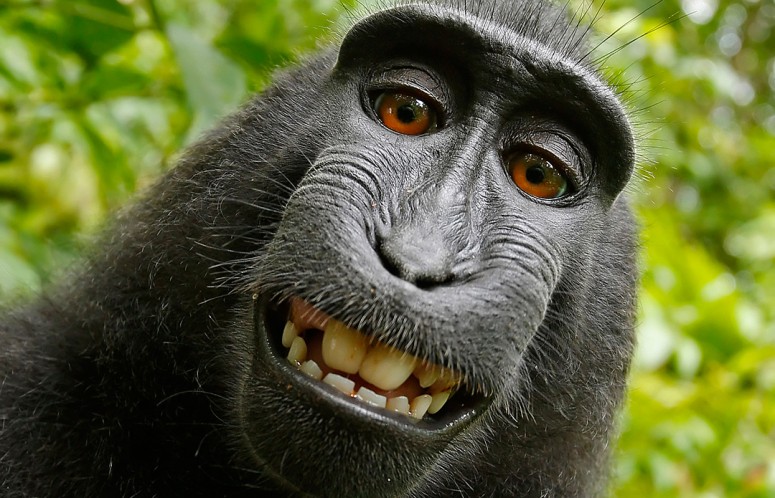
wikimedia commons
Humans are more distracted now than ever before, at least since we’ve started keeping records. Over the last decade, the average attention span has dwindled from 12 seconds in 2000 to just eight seconds in 2014, according to the U.S. Library of Medicine. The kicker: our eight second attention spans are one second shorter than a goldfish’s. No joke.
Who or what’s to blame for such abhorrent focus? “External stimulation,” says the Library of Medicine. That’s code for mobile internet, apps that vie for our attention, push email, social media alerts, work from anywhere, persistent connectivity, and our enthusiastic adoption of “the internet of things.” In other words, the only person we can blame is ourselves.
What’s a working professional to do then? You have three options, according to popular thinking: fall off the grid, stick with default technology settings for substandard productivity, or my personal favorite, set usage boundaries to upgrade concentration, contributions, and welfare levels.
For those interested in options one or two, this article won’t be any help. But for for those interested in the latter, there’s quite a lot you can do to stay focused in a 24/7 world. After extensive online research, here is the most celebrated and pragmatic advice for doing just that: Continue reading…
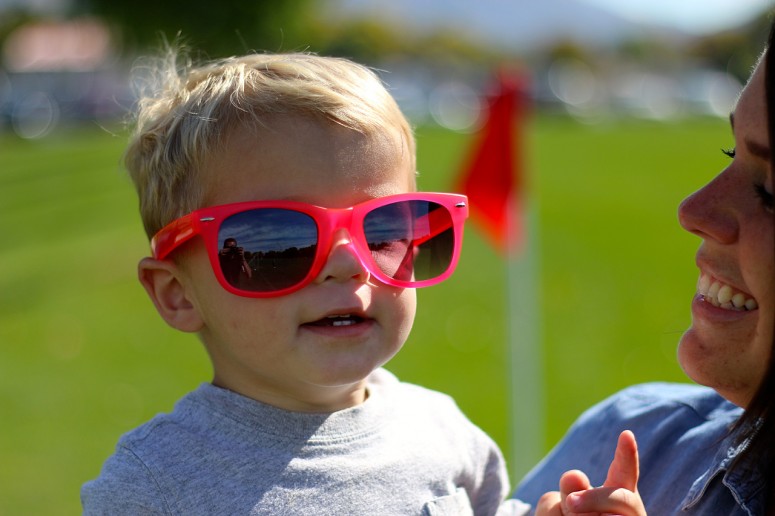
credit: blake snow
Life is hard sometimes. It’s always hard if you do any of the following with regularity: Continue reading…
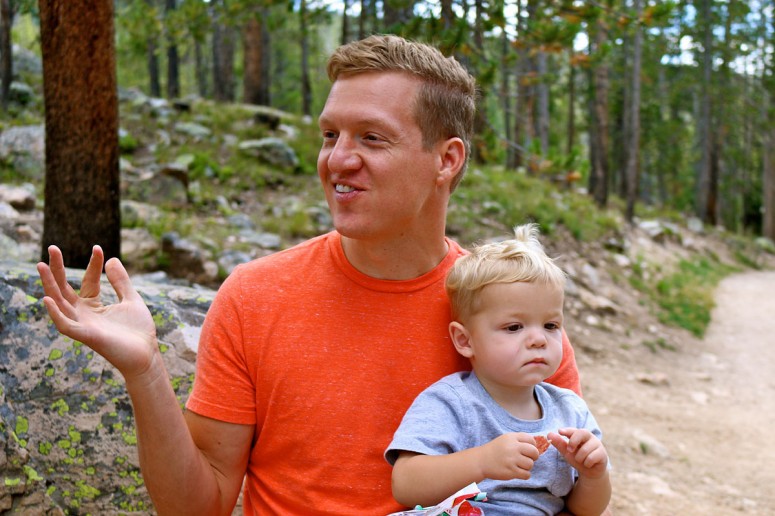
Photo: Lindsey Snow
In recent years, a new ideology has emerged. It is this: work-life balance is impossible; therefore, humanity must embrace work-life blending instead.
I tried work-life blending for six years before we ever called it that. I’m here to tell you it stinks and is largely a pipe dream—nothing more than a new term coined by self-absorbed workaholics to justify their personal regrets, negligence, and imbalances in life.
Now let me tell you how I really feel. Continue reading…

My wife taught me a valuable lesson recently.
For years, we’ve been planning to build a new house for our growing family. With that decision, we pegged a lot of other things to it, such as a new living room, new places to see, and even a family dog.
“Let’s update the living room after we move,” we told ourselves. “Let’s hold off on that vacation until we’re settled. Let’s wait for a dog until we have our own yard.”
We’ve held that belief for many years with various plans, not just shelter. Wait, wait, wait. When.. when… when… After, after, after. Continue reading…
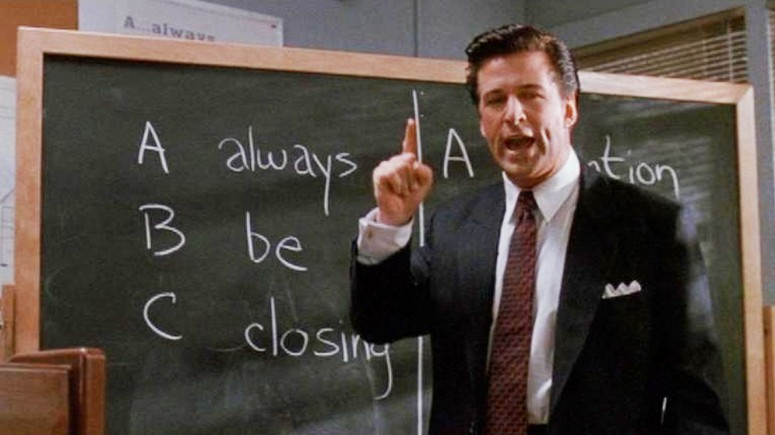
New Line Cinema
Selling is a challenge. It requires unwavering confidence, polite persistence, and a deep understanding of buyer demand. It also requires an ability to withstand constant rejection, unfortunate timing, and even bad luck.
Whether you sell to businesses or consumers, overcoming buyer objections in another challenge. Some may be unique to your trade, but most are quite common, regardless of industry. What are they and how can they be surmounted?
To find out, I ransacked dozens of reports, expert analyses, and top Google results. After the dust had settled, I encountered close to 100 specific objections. But most (if not all) of those are merely variations of seven fundamental objections, which I’ve distilled and categorized below.
Before getting down to the nitty gritty, a word of caution: sellers must first understand theirs and their prospects’ available “walk-away” options before addressing any concerns. If you don’t respect those, you’ll fail to appreciate the nuances of your market and have a harder time overcoming legitimate buyer objections.
Furthermore, “objections are a gift,” says Kyle Porter, CEO of SalesLoft. “It’s the customer telling you something that will help you sell to them.” In that sense, buyer concerns are rarely outright rejections—they’re merely requests for more information. Hence, good communication is key to overcoming them.
With that out of the way, here are the seven most common buyer objections and advice for overcoming them: Continue reading…
[youtube]https://www.youtube.com/watch?v=ZKxNCNtMd0U[/youtube]
I learned to play guitar sometime in the spring of 1994. I did it in a single day. Sort of.
Although I knew how to mangle the open chords for A, C, D, E, and G in the months leading up to that fateful day, the instrument didn’t click with me until my brother and his friend Dylan Denny demonstrated how to play bar chords the night before. “You mean I just keep the same finger formation and slide up and down the neck to play any chord I like, even flats!?” I enthusiastically asked. “Yup,” they replied. “That’s the beautify of power chords.”
I was so excited by this revelation — this power, if you will — that I called in sick the next day (i.e. I faked a cough and my mom let me stay home from school).
Armed with this new “life hack,” I learned to play Green Day’s entire breakthrough album by ear that day. I was so elated, I didn’t even break for lunch, let alone breakfast. I just played, played, and played, stopping the CD only to find the right chord. I even learned a few of the album’s basic “fills,” or poor man’s solos, as I call them.
Upon returning from school, my brother and friend were impressed with my progress. It’s not every day a rhythm guitarist is born. From that day forward, I wanted to “play rhythm” forever.
That all changed on a Wednesday night 13 years later. Continue reading…
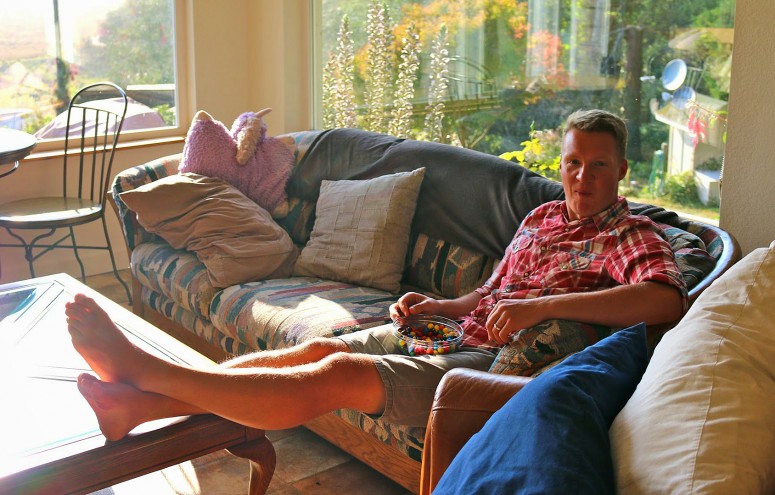
credit: lindsey snow
Bad habits. We all have them. Here are some of mine. But not for long. I’m not doing any of the following any longer. I’m done. For good. Watch me.
Continue reading…
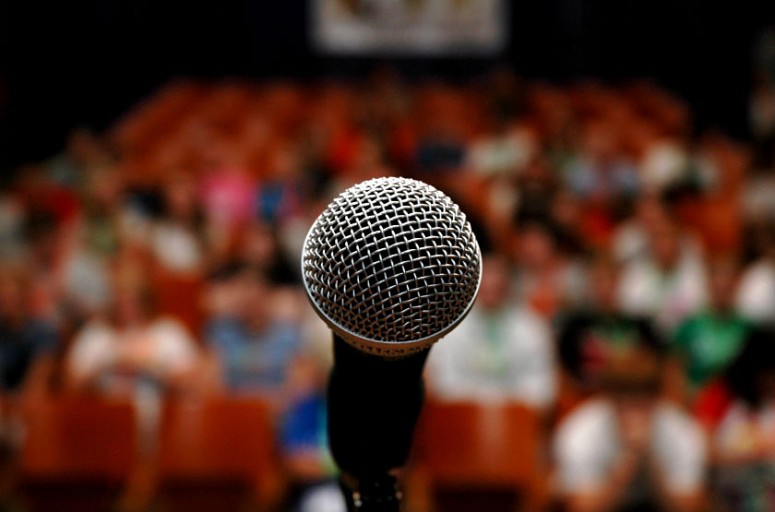
flickr/creative commons
What do great speakers such as Martin Luther King, Steve Jobs, and top TED presenters have in common? Why do we remember phrases such as, “I have a dream,” “Getting fired from Apple was the best thing to happen to me,” and “Ask not what your country can do for you; ask what you can do for your country”? What’s the most effective way to persuade a listening audience, either to laughter, action, awareness, or inspiration?
After researching dozens of the Internet’s top search results from a broad range of expert or otherwise popular speakers, we have answers to those questions and more. Of course, there’s no foolproof way to becoming a charming or memorable presenter. But there are several virtues all great speakers uphold. Chief among them: Good orators change the emotions of their audience, rather than just informing them. They inspire them, encourage them to act.
Whether you’re motivating a distrustful audience, leading a team of individuals, selling the next big idea or product to market, or even entertaining a hard to please crowd, here are 10 qualities all good presenters posses: Continue reading…
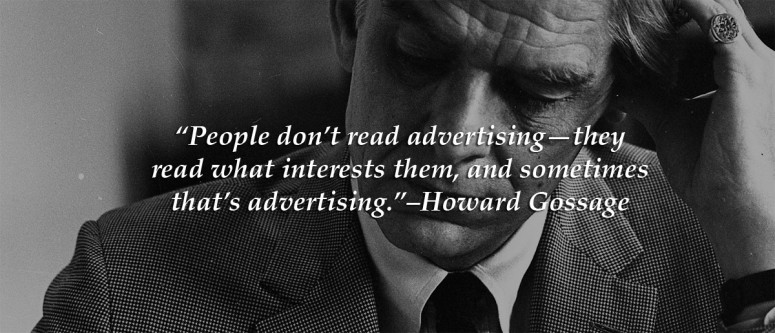
Howard Gossage was revered for his copywriting skills
Most people don’t know the difference between copywriting and editorial copy. I write the latter, which is generally understood by plebians as long-form “magazine articles.” The former is short-form and widely used in advertising and marketing to persuade someone to buy a product or influence their beliefs.
In any case, I usually don’t copywrite in a technical sense. I sometimes get asked to but usually decline. Unless, of course, Nike asks me to, which they did last year. Here is that story. Continue reading…
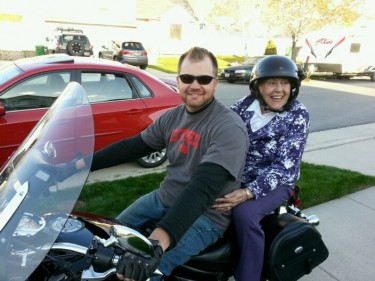
My wife’s grandmother, Beverly Ridd, was forever young
You wanna know what scares me most about getting old? Becoming calloused, jaded, and crotchety.
To counter that, I try to see the good in the world, surround myself with positive people, recognize the value of younger generations (as opposed to bemoaning their shortcomings), and do things that make me feel young again.
To help with the latter, TIME recently compiled a bunch of anti-aging activities backed by science. Here are a few that stood out: Continue reading…
Why do some people willingly participate in unpleasant things like regular exercise, cold showers, bland but healthy food, sacrificial restraint, and drinking lots of water, which cause a lot of annoying bathroom runs?
The short answer: Everything has a price. Good health is no exception. In exchange for long-term health, humans must endure short-term discomfort associated with the above.
In more succinct terms, “no pain, no gain.” That’s the catchphrase Jane Fonda popularized in ’80s workout videos to express that rewards are worth the work. Or as David Morris wrote in The Scientist, “The road to achievement runs only through hardship.”
In my experience, that’s the case for good health as much as anything in life. Of course, knowing that won’t make difficult things easy. But it does give them meaning, which I believe lessens suffering.
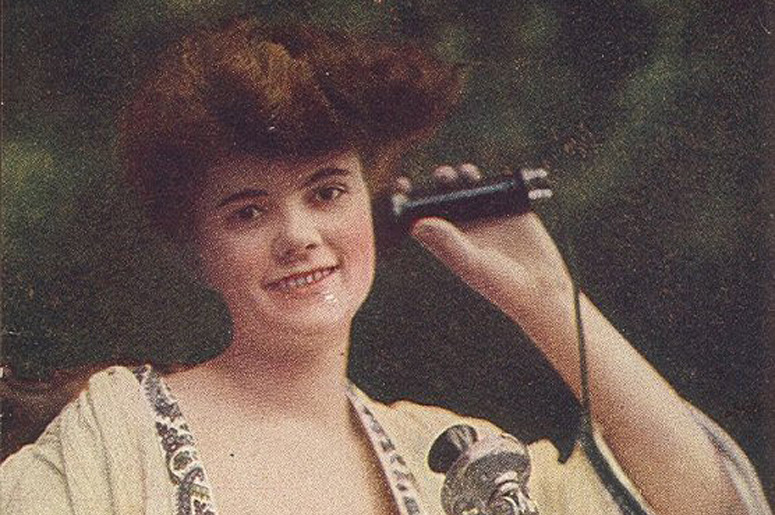
Wikimedia Commons
“I really wish I spent more time on my phone,” said no one ever. I doubt anyone will.
And yet, many of us can’t resist the Kavorka of our phones, in times of idleness or activity. What’s a modern human to do?
Don’t worry, Internet denizens. I got you. After five years on a lean, enlivening, and offline-rich phone diet, here are eight things you can do right now to put your phone in check, free yourself from its compulsive clutches, and live in the moment: Continue reading…

courtesy: snow family
I don’t remember everything I read this year. But excluding short-form literature, these are the books and essays that impacted me most: Continue reading…
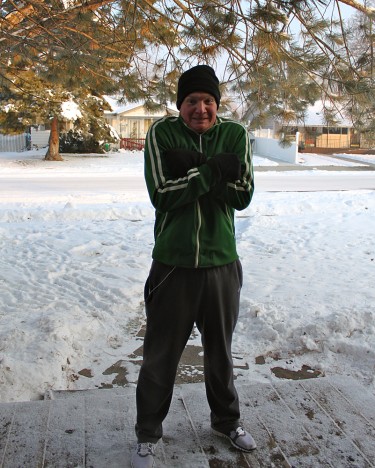
credit: lindsey snow
A funny thing happens to humans in winter. At first, the coldest equinox is a magical time for children, especially when it snows. With age, however, those same humans sometimes grow to despise the season. They become calloused by it; discouraged by it. They forget the importance of it to new life; the relevance of it as a requisite opposite.
Upon relocating to Utah 12 years ago, I felt even more jaded by winter given the increased snow here. I didn’t care that this desert land accumulates most of its water from white-capped mountains that melt in spring. I didn’t realize just how water-less summer would be without winter.
All I knew is that I didn’t like commuting in it. And I was a really important person then, busy getting from A to B as fast as I could. Winter, you see, slowed me down. Continue reading…
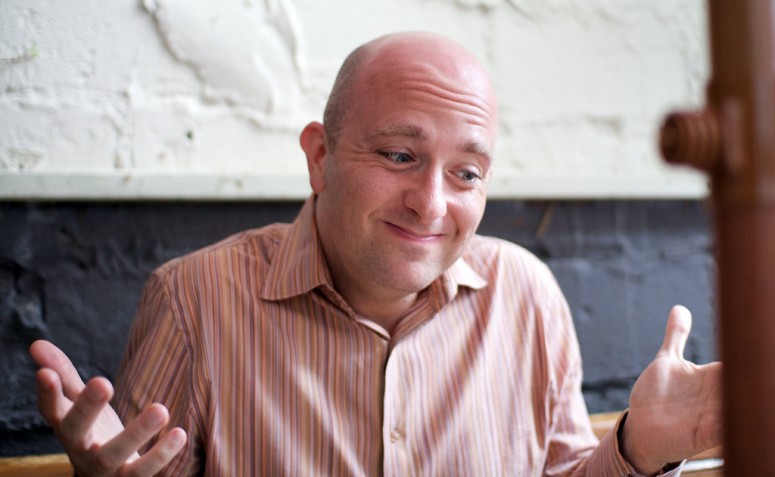
wikimedia commons
Several months ago, my wife and I were discussing truths we want are children to know. Although I’ve covered the topic before, I’ve since recognized several more while reiterating others.
Granted, you can’t expect to learn the below principles in a couple of sentences. But maybe, just maybe, this commentary will spark your curiosity and challenge your worldview for the better: Continue reading…

Wikimedia Commons
“What do you do?” is a question humans often hear. It’s a new acquaintance’s favorite ice breaker because it’s socially acceptable, easy to answer, and easy to process. Doctor. Carpenter. Businessman. Homemaker. Forget and move on.
Problem is, we are so much more than our occupation, even workaholics (although they might not realize it if wholly absorbed by their trade). The better question to ask when meeting new people is this: “What do you like to do?” Asking that will give you a truer glimpse of who someone is, because what we think about and do under no obligation is a better indicator of who we really are.
Continue reading…

Football began in earnest last week. Not that kind. The oblong American kind. The “hoorah!” kind.
For now, I couldn’t be happier. BYU‘s undefeated and ranked 25th in the country. Seahawks look dominant enough to repeat as Superbowl champions. And even the most jaded fans are full of hope, smiles, and optimism right now. That always makes the world a more enjoyable place to live.
Of course, that’ll change as the season wears on. For most of us, frowns are just around the corner. But there’s a simple trick I’ve learned over the years to avoid letting an uncompetitive or unlucky sportsball team ruin your night, day, week, month, autumn, or even year. It is this: Embrace fair weather fan status. Be proud of it. Bandwagons are fun.
Continue reading…
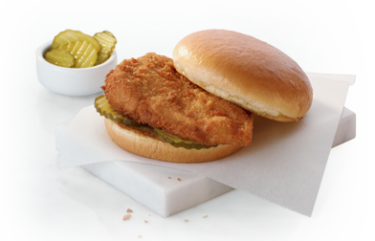
Chick-Fil-A
I want all my children to work fast food someday. Why would I subject the little darlings to low pay, hectic dinner rushes, rude customers, demeaning work, ignorant coworkers, monotonous tasks, slippery shoes, and stinky clothes?
The short answer: Life is filled with the above, so you might as well expose ’em while they’re young. The long answer: Much of what I learned in business I learned from fast food. Not the creative stuff. Not sustained rejection. Certainly not cerebral problem solving.
But working fast food taught me the essence of hard work—livelihood’s version of basic training. After two years as a low-level cooking, toilet cleaning, truck unloading, chicken suit wearing, stench absorbing, fry serving, drive-thru calling, and overly perspiring wage-worker at Chick-Fil-A, here’s what I learned about business, customer service, teamwork, and life: Continue reading…
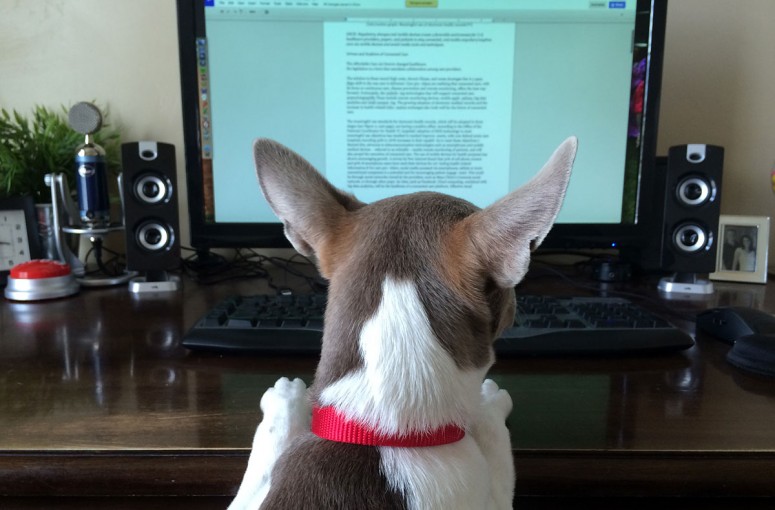
Photo: Blake Snow
Americans rank near the bottom in work-life balance because we work more than anyone, that much we know. (Caveat: We don’t work more than we used to, according to decades of research by John Robinson. We just perceive busy-ness as work and fill our free time with it. More on that later.)
But we don’t have to work as much as we do. Quite the opposite, in fact. “Researchers note that productivity rates have risen, which theoretically lets many people be just as comfortable as previous generations while working less. Yet they choose not to,” reports the New York Times. Even visionaries admit as much. “The idea that everyone needs to work frantically is just not true,” says Google CEO Larry Page. “Reducing the workweek is one way to solve the problem.”
I decided to do just that recently in switching from a five to four-day workweek. Like after I quit working nights and weekends, I won’t ever go back (given the choice). In four days, I’ve gotten just as much done as I did in five, because I waste less time now. As the forward-thinking Jason Fried explains, “Constraining time encourages quality time. When you have a compressed workweek, you focus on what’s important.”
So we have evidence that all this snazzy technology lightens our load, increases our productivity, and allows us to work less. And yet we still choose to work more than we need to. Why?! I’ve researched the issue for my book and came away with the following five answers: Continue reading…
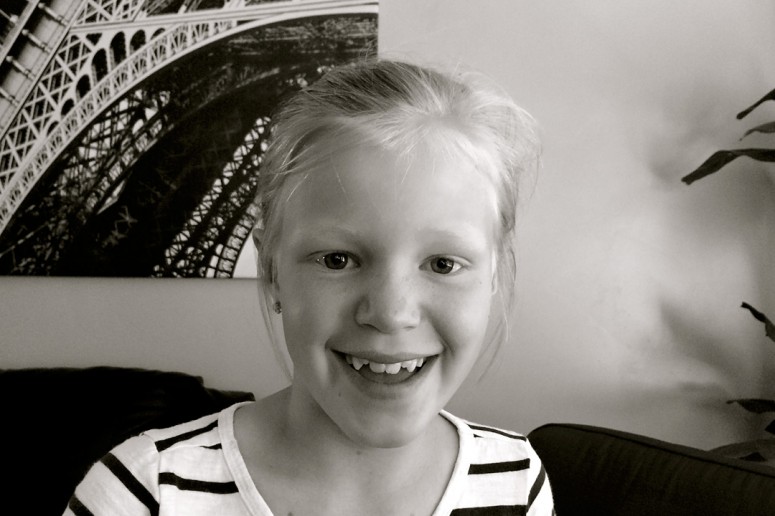
Photo: Blake Snow
Last month, my eight year-old daughter subdued me in a remarkable way.
Our dog Harley had just disobeyed orders. As I confronted him, he urinated on our floor for the umpteenth time.
Now, there are a lot of things I dislike about Harley. He pees like a girl. Recoils from house flies. And his nervous system is a little too nervous. But my least favorite thing about Harley is his knack for urinating a few teaspoons at times when I—the perceived “leader” of the pack—order or reprimand him.
It’s called submissive urination and it’s downright annoying for two reasons. First, I’ve had to clean up dog urine, several times a day, even though he’s been house trained for months. Second, I have no idea when to expect it, even though Harley is normally an obedient dog. Continue reading…

© Blake Snow
As an amateur photographer, I sometimes get compliments on the photos I take. Here’s my secret: Continue reading…

Blake Snow
I quit social media four years ago. By that I mean I quit Facebook, Twitter*, Google+, LinkedIn and other “social networks” that require the declaration and management of electronic relationships. Since then, my personal and professional lives have been greatly enriched. So much so, I don’t plan to join digital social networks ever again. (More on that here.)
Unless, of course, those networks can enhance my physical relationships. Consider, for example, Google Hangouts, an ad-hoc social network. After reluctantly declining six months of invites, my wife recently convinced me to join. I’m glad I did. It’s allowed me to stay in close touch with extended family without colleagues, associates, admirers, like-minded people, or old high school acquaintances getting in the way. It’s also let me indulge in animated gifs.
But even this endearing network has become a distraction at times. By my own doing, it’s sometimes made me lose sight of the big picture. Continue reading…

Snow Family
My wife and I recently borrowed a large sum of money to buy a highly illiquid asset. To secure the loan, we disclosed more of our financial behavior to the bank than we’ve admitted to anyone else, including God. And rightfully so—again we were borrowing a large sum of money, and they wanted to make sure we’d pay it back.
In addition to scouring our personal finances, the lender took a fine tooth comb to our business finances. I’m self-employed. But my wife owns 50% of “the company.” I generate and service all the income. She gets half. Many would call her—as my lender often did—a “silent partner.” But she is anything but. Continue reading…

Paramount Pictures
My wife and I watched Stardust recently. It’s been on my watch list for years, given its high viewer rating. But the crap poster always kept me from hitting “play.”
I’m glad I finally did. Stardust is a five-star film. The best fantasy movie I’ve seen since The Princess and the Bride—maybe even better. It’s certainly better than the under-edited Lord of The Rings, the most popular fantasy film of late. (Don’t worry nerds, I kept my sub-genres separated.)
In any case, I liked Stardust so much, I immediately read the book. It’s good but ends with a limp. The movie, on the other hand, ends with an enormous and climatic bang. The similarly-ended The Natural is the only other movie I can think of that is better than the book.
Can you name any others?
 I slipped up. After resolving five years ago to never work from bed again—thank you, Montana—I did it again recently.
I slipped up. After resolving five years ago to never work from bed again—thank you, Montana—I did it again recently.
“I’ll just work a little,” I told myself. Several hours later, I finally put the computer down. It was AM o’clock and I was fried. With lights off, I stayed up an hour or two longer, still trying to solve work stuff.
Of course, I woke up exhausted and sluggish. Had an unproductive day. Struggled through much of it.
But it was an effective reminder: Working from bed and overtaxing your brain is no way to live—at least for me. To be fully operational, you gotta keep your thirds separated.
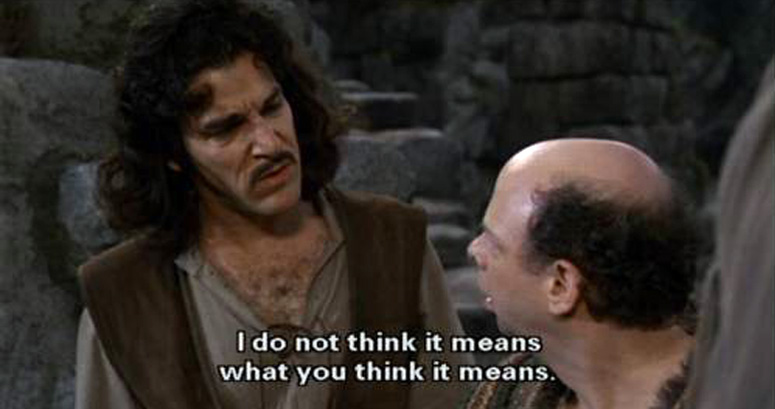
20th Century Fox
Dan Waldschmidt thinks “faking it til you make it” is horrible advice.
But the catchphrase doesn’t mean what Waldshmidt thinks it means (spoken in my best Inigo Montoya accent). A quick Wikipedia search would have informed him that “faking it til you make it” means imitating confidence until you find real confidence—not stretching truth, bending rules, or denying reality, like the columnist mistakenly believes it means.
The first commenter on his syndicated post said it best: “‘Faking’ doesn’t mean “lying.’ It means faking that you are confident, self-assured, knowledgeable—when you, in fact, you’re not. It is excellent advice and helped me overcome many fears and doubts.” Or as Amy Cuddy says, “Fake it ’till you become it.”
Hear, hear! I, too, have faked my way to becoming a responsible adult, marketable guy, husband of one, and father of five. For me, the catchphrase is easily one of the top 10 pieces of advice on finding success.

Excepting more embarrassing personal stuff, here are the changes I hope to make next year:
- I’m gonna speak softly to my kids. I’m loud. With my choice of words and opinions as much as my volume. Children don’t need that extra emotion as they’re figuring out the world. Often times I bark at my kids when they make a mistake or disobey. On a whim recently, I tried something different. Instead of scolding my three year old with a mean face and verbal outburst, I kneeled down, leveled my eyes with hers, softly expressed my disappointment, and encouraged her to change. She lovingly accepted and immediately improved her behavior. After overhearing the exchange, her older sister said, “Dad, I like when you talk to us like that. I feel a warm spirit in the room when you do that.” Then this happened. Then I resolved to speak kindly when disciplining my children from that day forward. Continue reading…

U.S. Army
Beyond the obvious weight loss and cardiovascular benefits of regular fitness, here are a few bonus consequences of working on your body:
- Your skin improves. If vanity is your top goal for getting in shape, I’ve got good news: Regular exercise, particularly when coupled with a healthy diet, does wonders to your hue. If you’re white and pasty like me, your skin starts glowing the longer you work out. It looks healthy, full of color, slightly tan. The reason: “Exercise enhances blood flow to skin,” says Dr. David Katz. Plus, sweating works as a natural cleaning agent, unclogging pores and removing oil and dirt for fewer zits. My skin has never looked healthier. What a pleasant surprise. Continue reading…
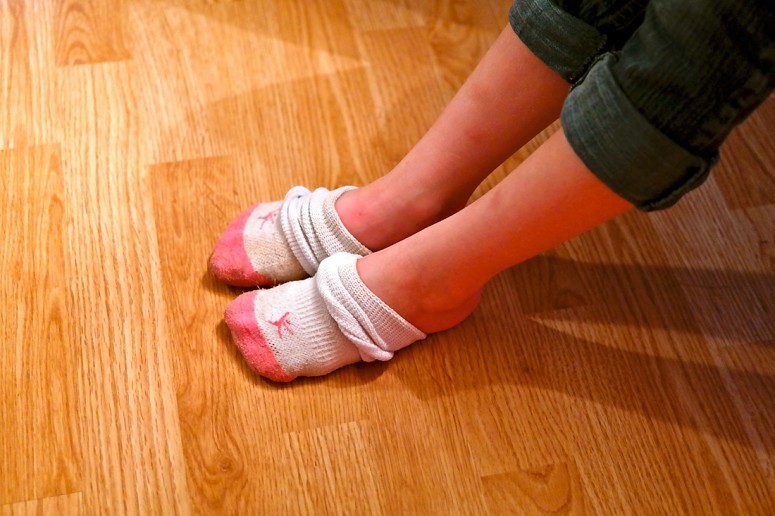
Blake Snow
See how my daughter is wearing her socks? I’m the only other person I know that does that, particularly if my ankles get hot.
Your ankles get hot? Yeah, my ankles get hot.
The complexing thing about this behavior, however, is that I haven’t “half socked” in years, certainly not since my daughter was old enough to notice. “Where did you learn to do that??!!” I asked in amazement the first time I witnessed her doing it. “I don’t know,” she shrugged. “Why?” I followed up. “Because my feet were hot.”
Maybe my daughter did observe me doing it and followed suit. Maybe she saw some other weirdo do it and mimicked them. I don’t doubt other explanations.
But maybe, just maybe, my daughter did it because her genetics told her to. Maybe, just maybe, human offspring remember select quirks that having nothing to do with evolution and everything to do with social continuity.
As a father, it was an exhilarating connection that I imagine gets better with age.

Yahoo
It should be obvious, but for many it isn’t. They’ve forgotten how to live in the moment, be alone with their thoughts, and use “forever empty” as motivation to better themselves. Continue reading…

Imgur


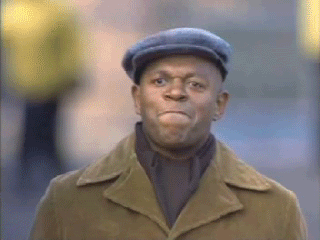
For me, 2013 is a year of tens. Ten years of marriage. Ten years of taking care of business. Continue reading…

“I don’t mean to alarm you, but she may have brain cancer.”
That’s the scariest thing I’ve ever heard as a parent. Uttered to me by a confused pediatrician after failing to diagnose my two year-old daughter for the umpteenth time, the sentence dashed my hopes and struck fear in me like no other.
It started like this. Two weeks prior, my daughter began vomiting in her sleep. Curiously, she would upchuck like clockwork — three hours after bed. After a few days, she begin dropping weight. Her eyes sunk in. She looked sicker than any of my children had before. Continue reading…




 Why are suckers born every minute? How can we explain “
Why are suckers born every minute? How can we explain “
































 I slipped up. After resolving five years ago to never work from bed again—
I slipped up. After resolving five years ago to never work from bed again—








